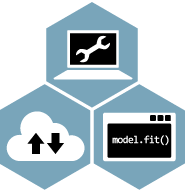At Northwest Data Consulting we provide consulting services focused on data analytics, engineering, AI, and machine learning in the Pacific Northwest and beyond.
Make the most of your data
Let’s be realistic: getting the most out of your data can be difficult. These days, even many small companies are dealing with volumes that would have been considered ‘big data’ just a few years ago. And it’s not just the volume of data which is proliferating, but the number of sources as well. You might have data for your application, HR, finance, customers, sales, project management, and more. The average small company (fewer than 500 employees) has 172 applications in their tech stack, spends $7.9m/year on tech, and adds 4.4 new applications per month. And if you’re a tech company, the data picture is even more complicated, because you’re probably using even more tools. Every time you add an application, the picture gets more complex because each one of those apps might require interfacing or integration with several others, so complexity grows non-linearly with the number of applications in your stack.
There are a number of reasons why research shows that most companies are not using data the right way. We’ve reached an inflection point where the enormous and rapidly growing number of tools available for working with your data can easily be a liability for companies that cannot properly navigate the data space. Every day we read stories of businesses that are achieving big wins with their cloud deployment, automation, AI, and so on. But for every one of these companies that have found a formula for transforming their business, many more are struggling to find the right formula for success, and that struggle is costly.
Sometimes you do need new and/or better tools (though newer isn’t always better). I’m continually astonished at the number of companies that conduct their analytics as if they were still operating in 2010 or 2000 (I’m not joking), blissfully (or more like agonizingly) unaware of those better tools which could dramatically improve their analytics operations. There are more companies who are aware that they need better tools, but struggle with the decision of which tools, in which combination, will work best for them. Even when they have identified their ideal stack, yet more companies have difficulty organizing their team efforts to make best use of those tools. The most important solutions are not always technical, or at least not primarily so. Sometimes those solutions are cultural and organizational. You can have the best individual team members, and the best tech stack, but if that team isn’t organized properly, you will still fall short in getting that critical insight that is so important to the success of your business.
Are you overwhelmed with data? Let us help you find the right technical and organization formula to make your data operations fire on all cylinders. Schedule a consultation with me on Square to get started with your data-driven transformation. Initial consultations are free.
 Northwest Data Consulting
Northwest Data Consulting